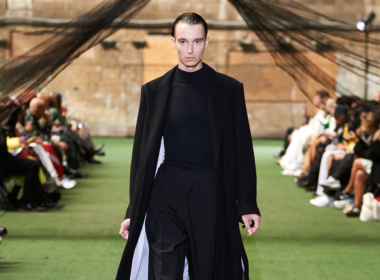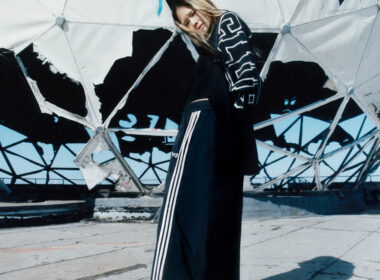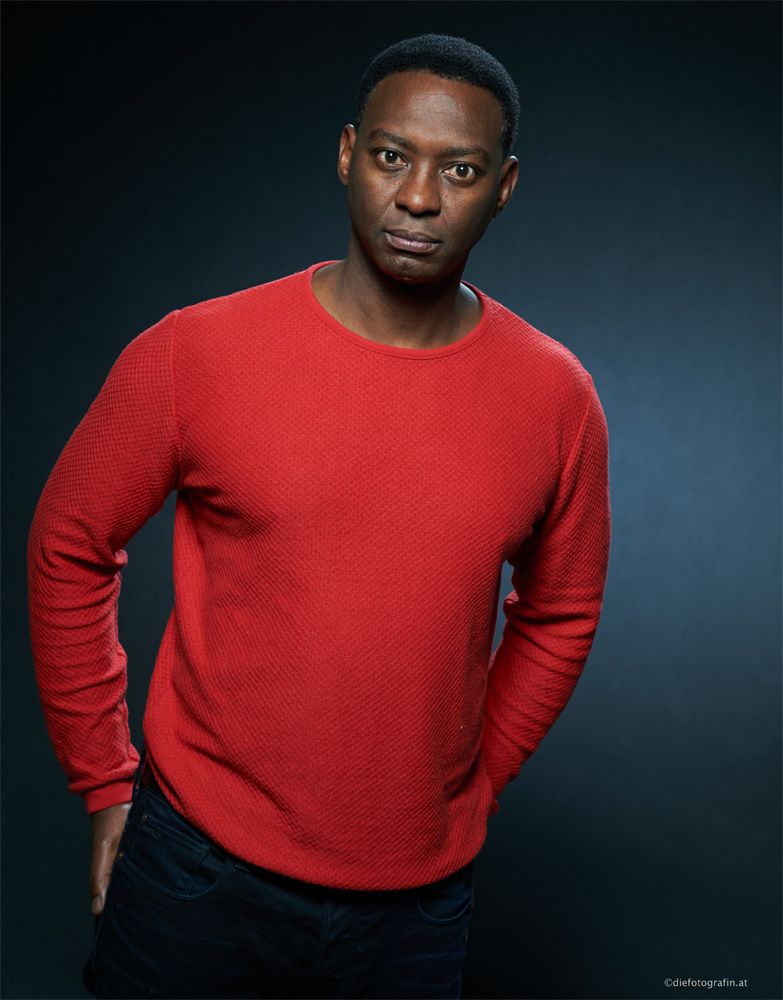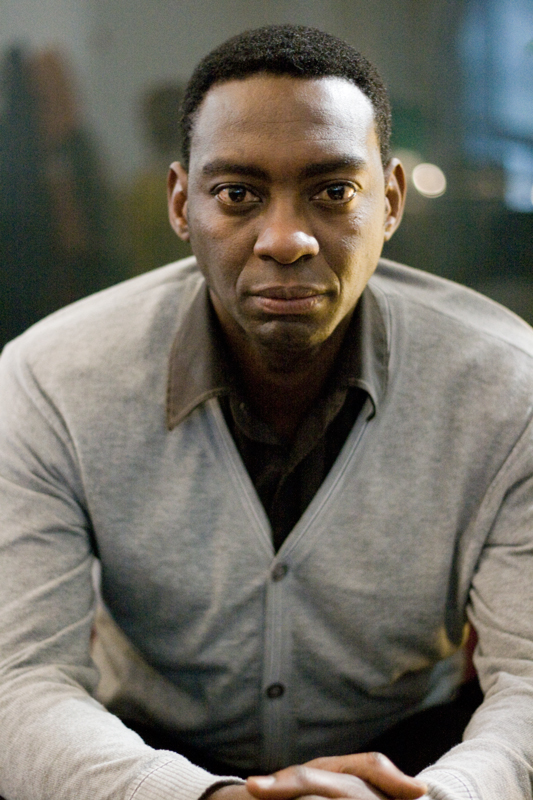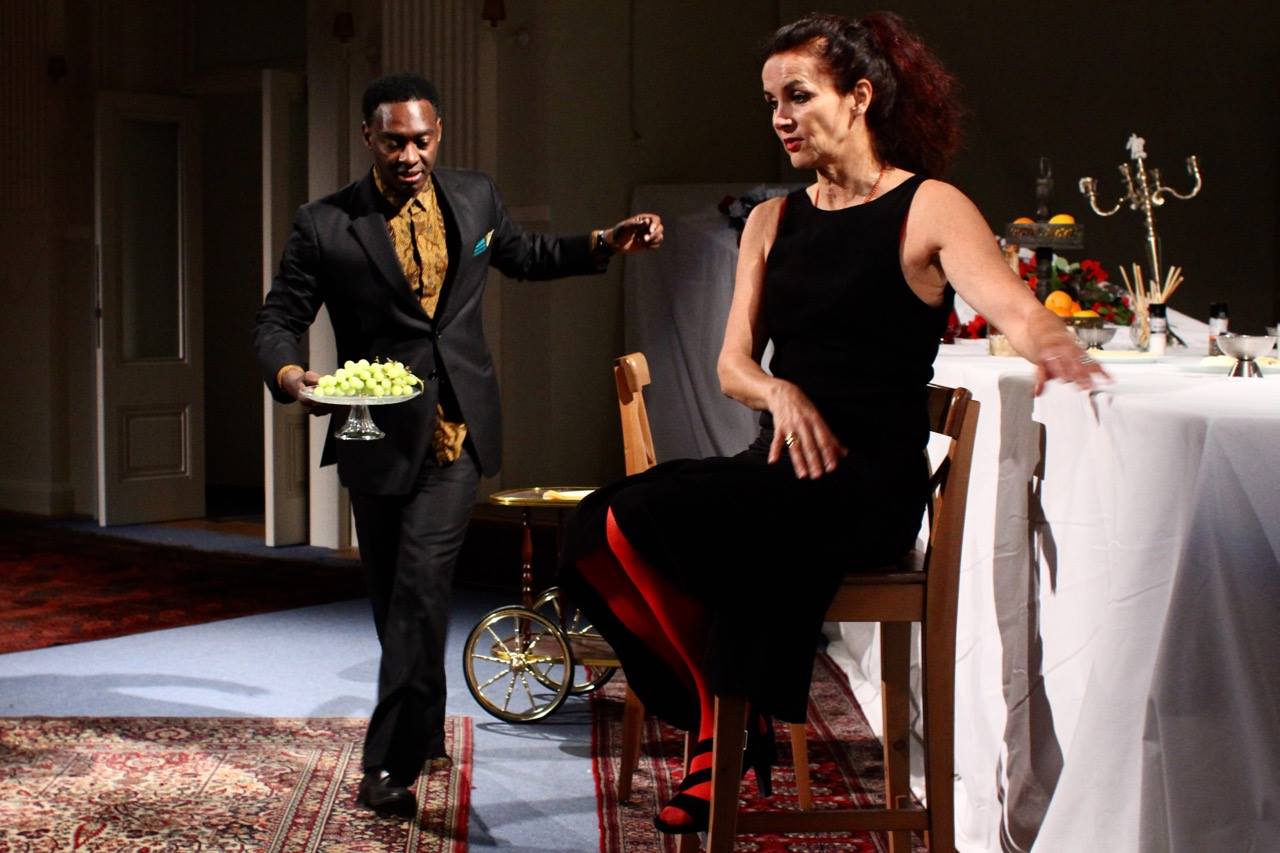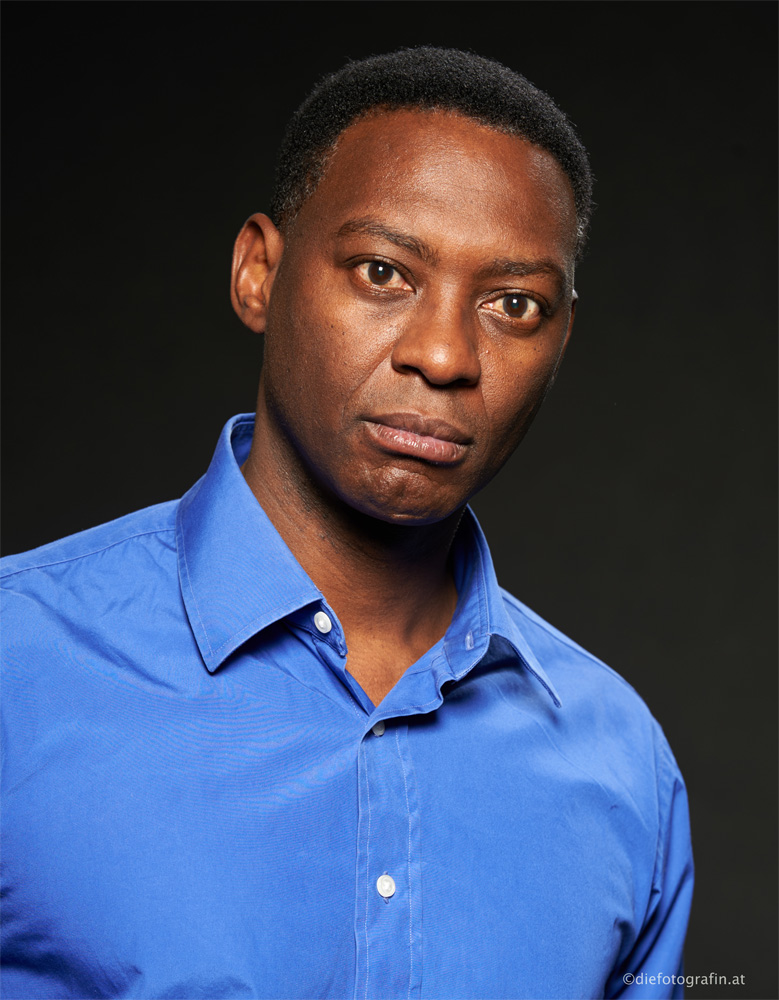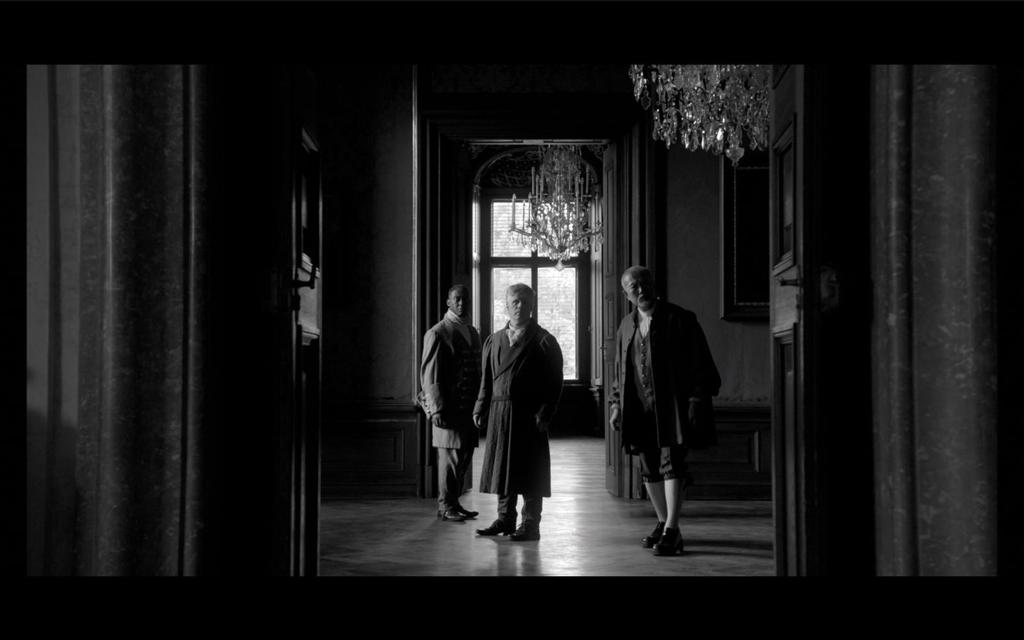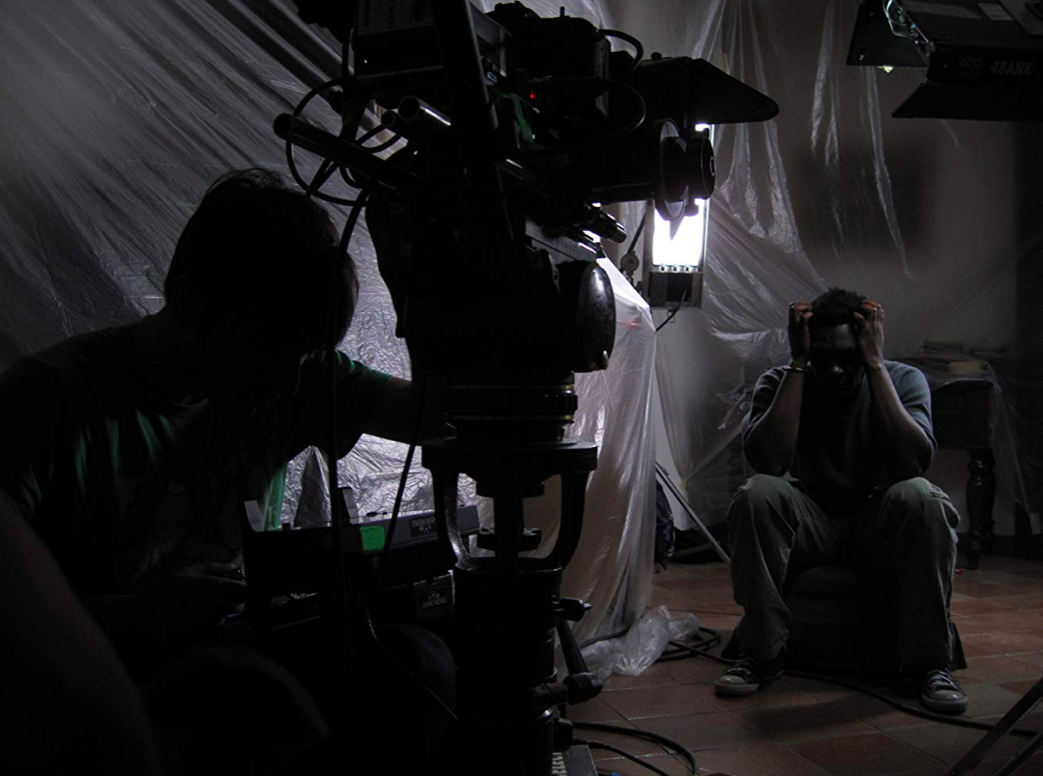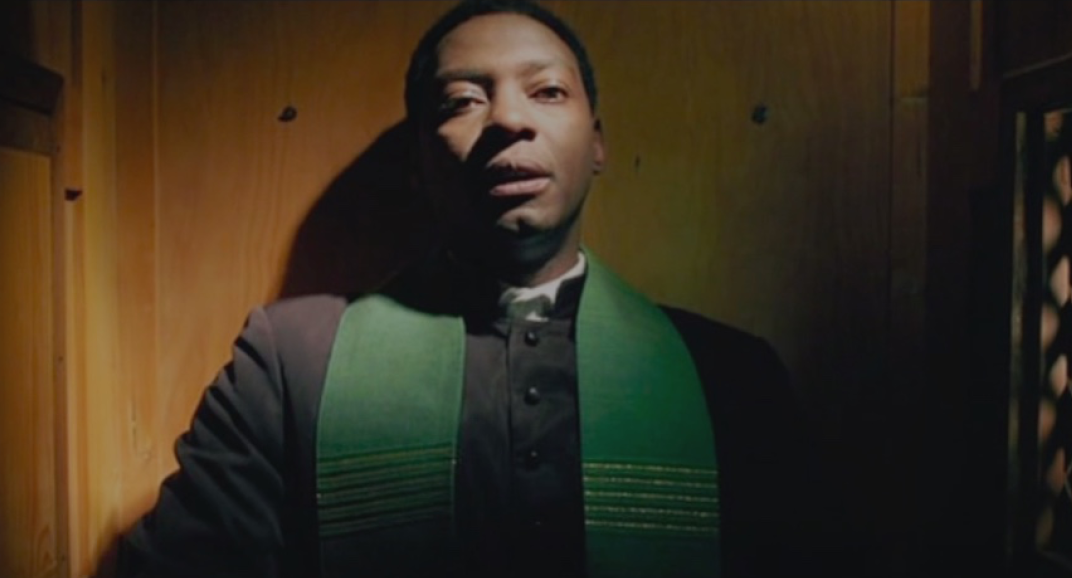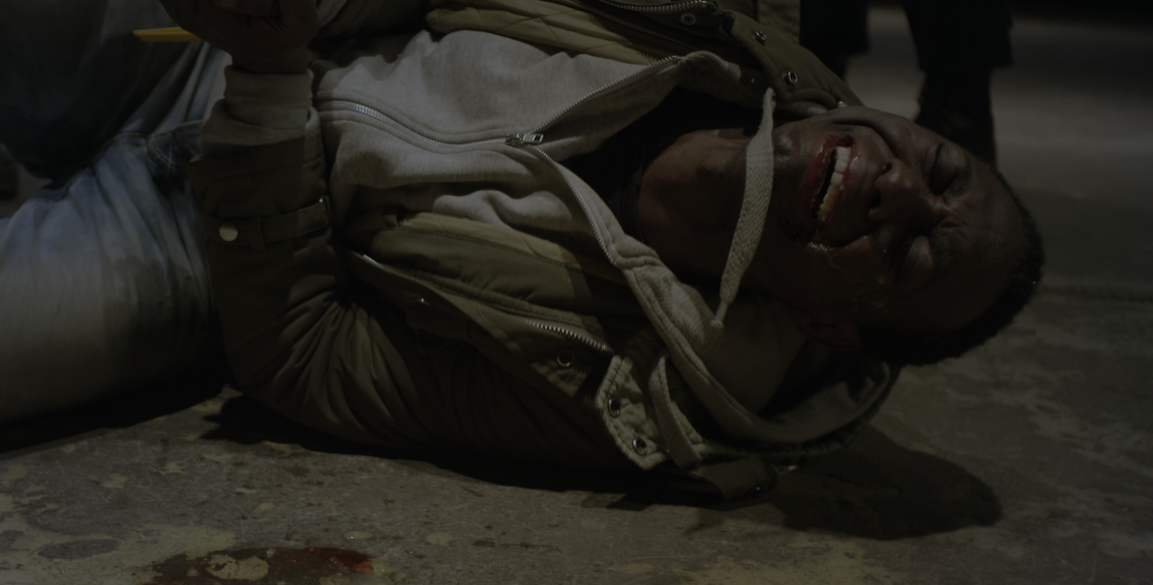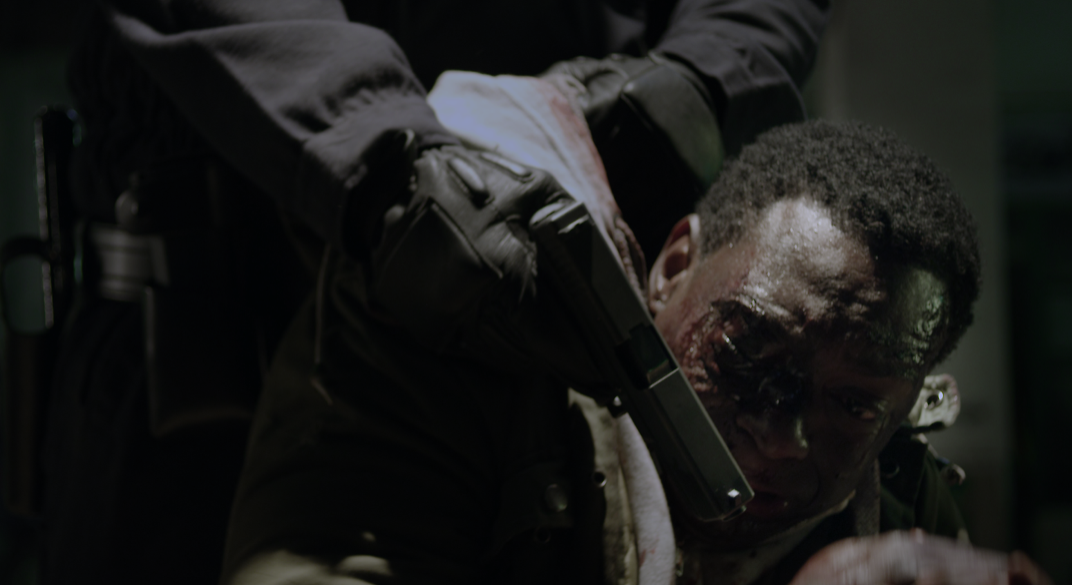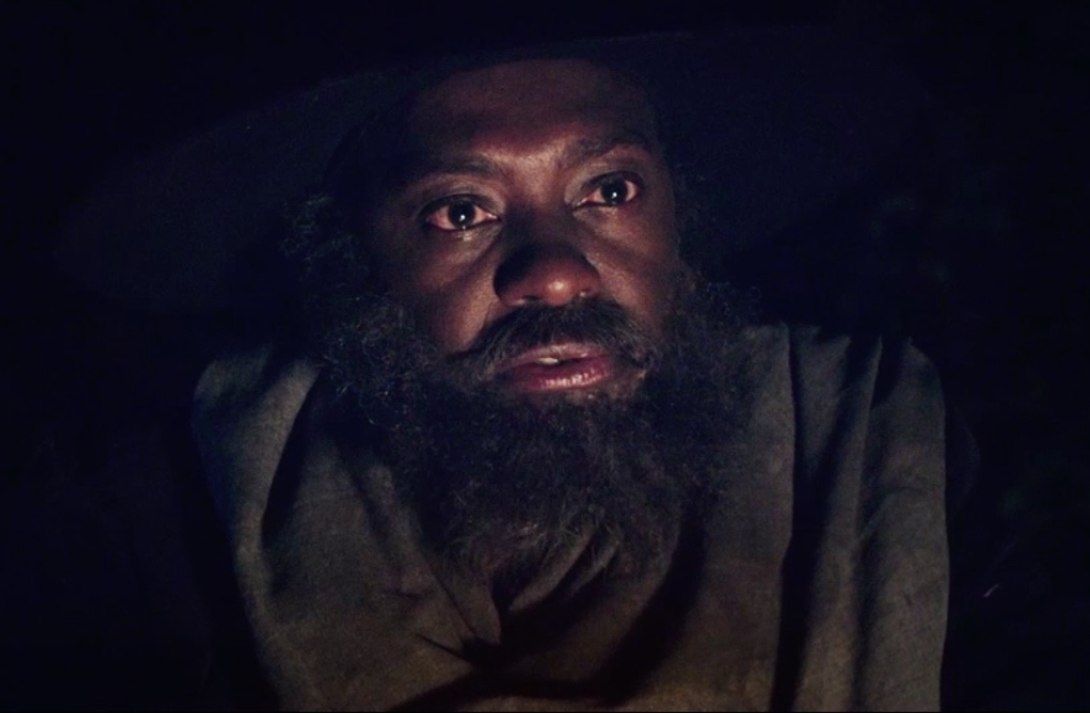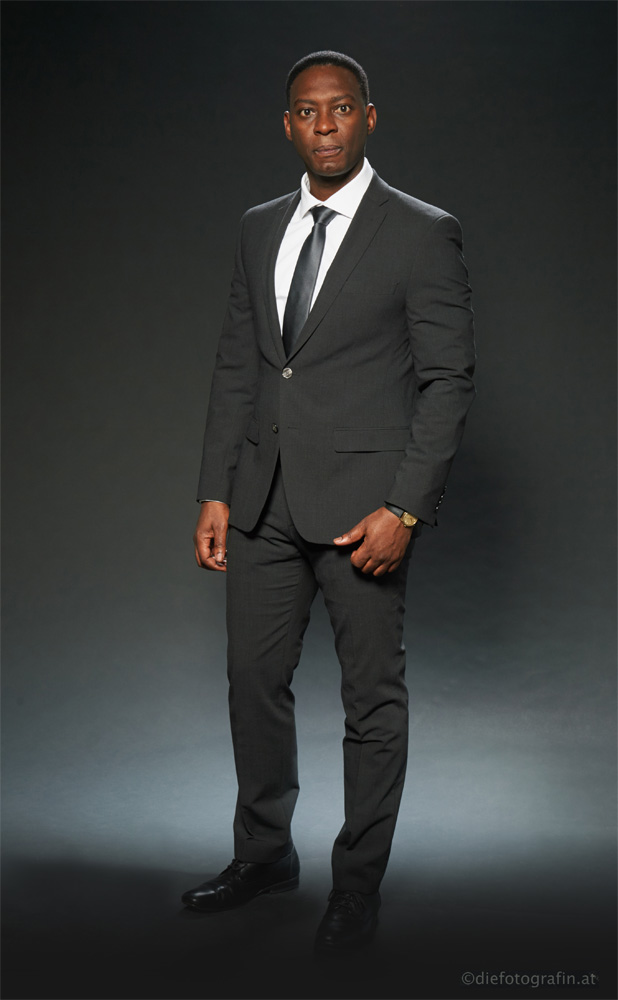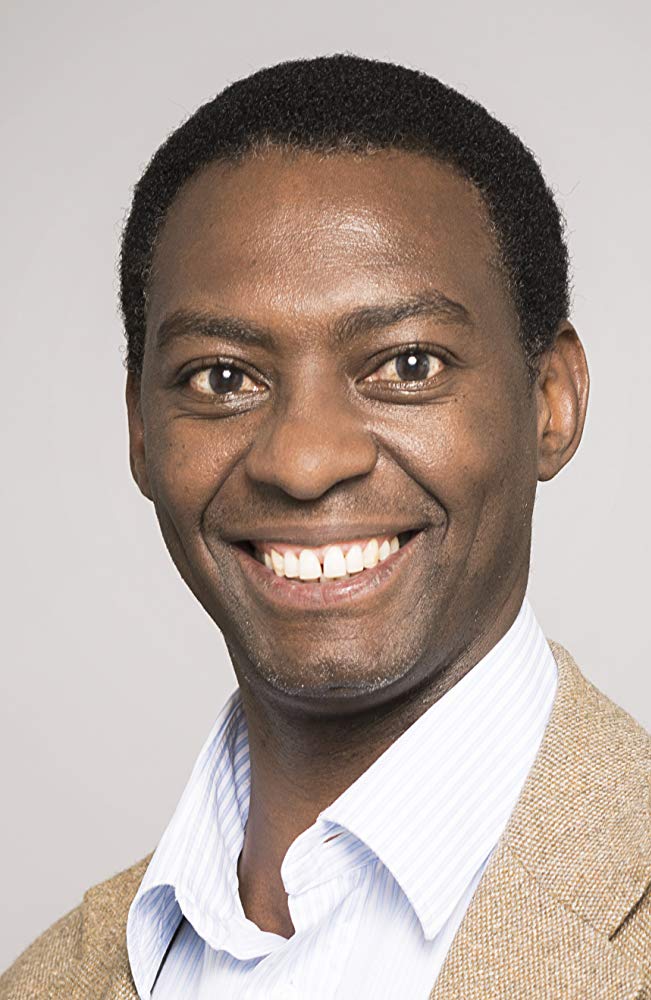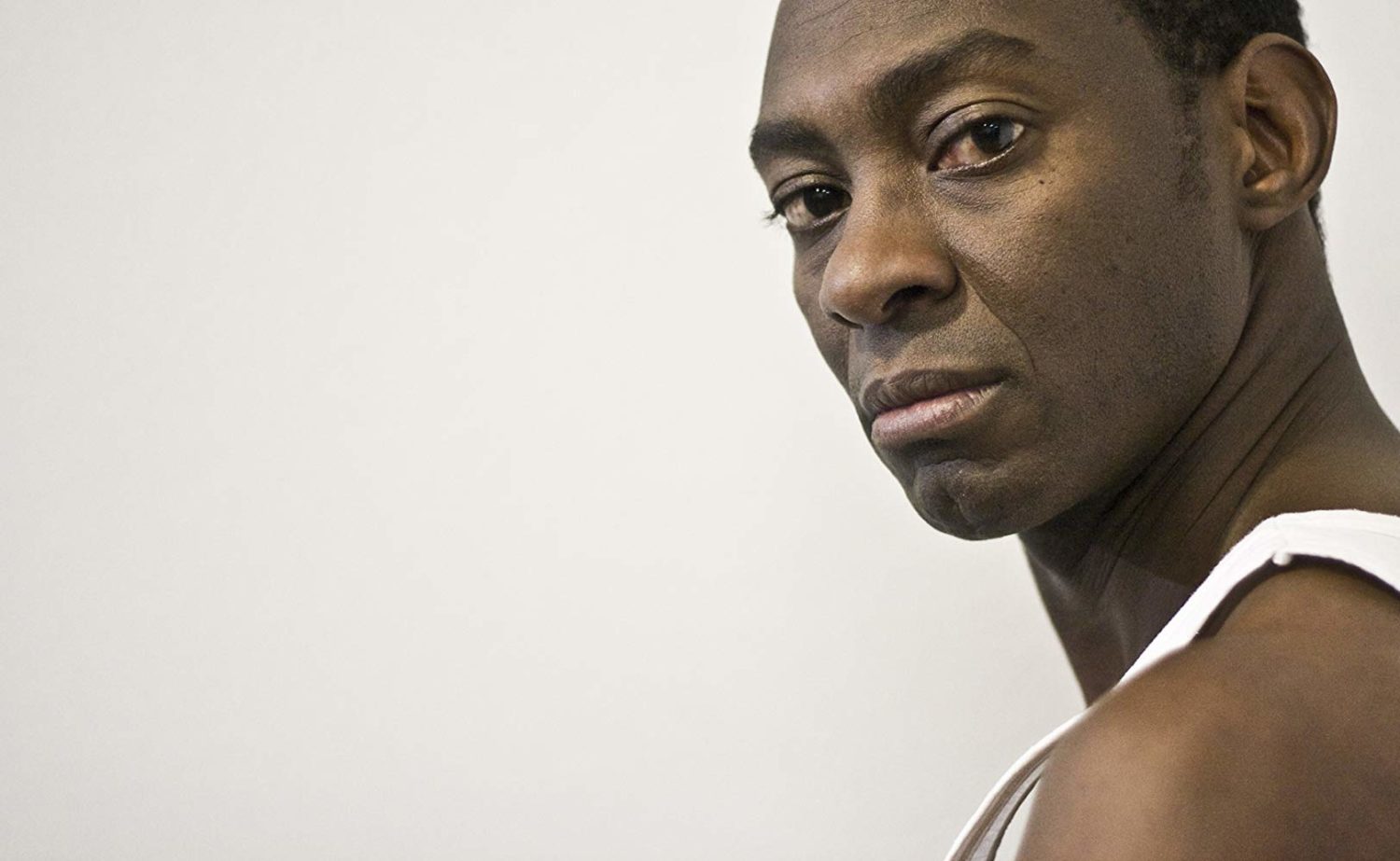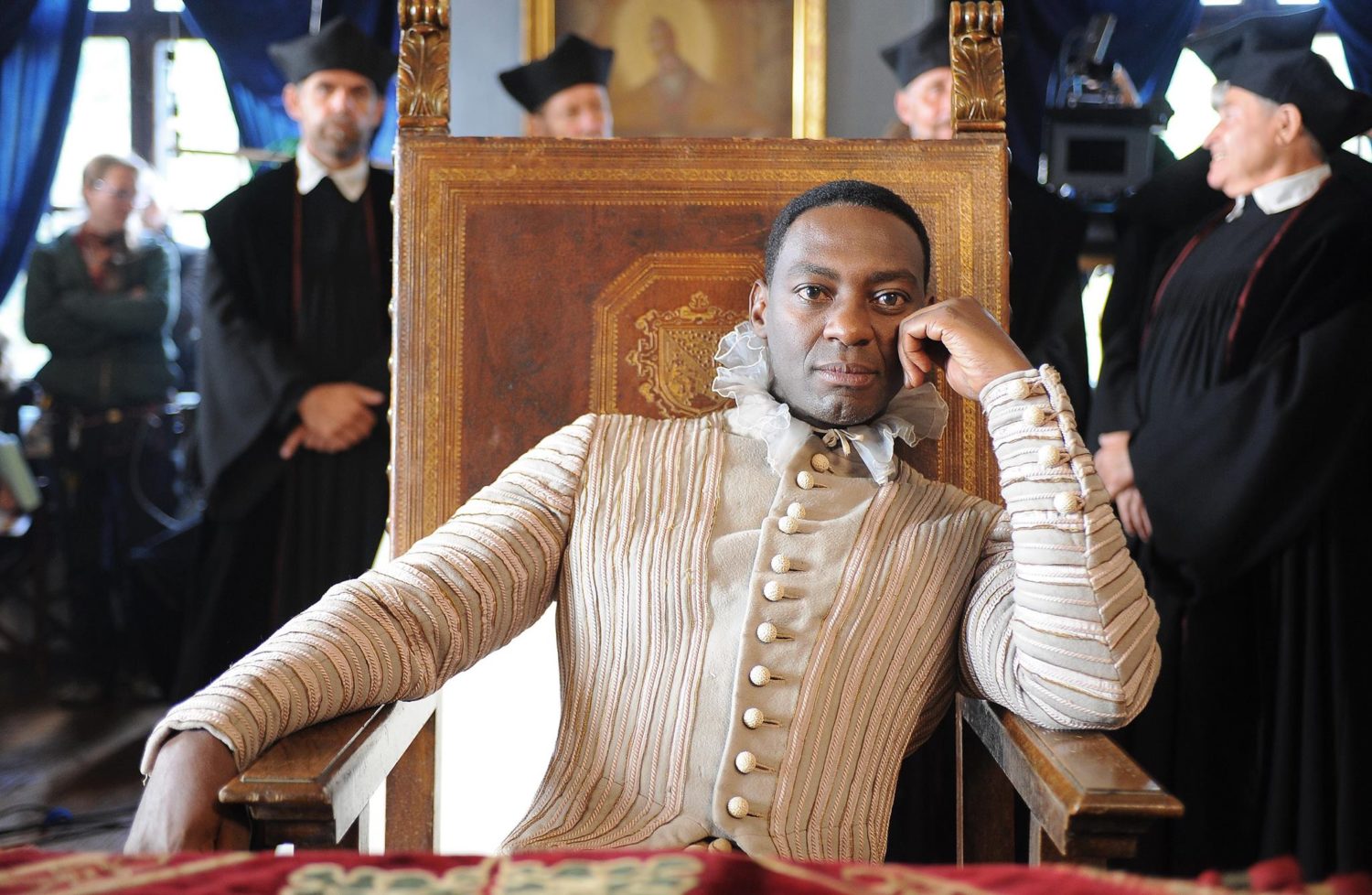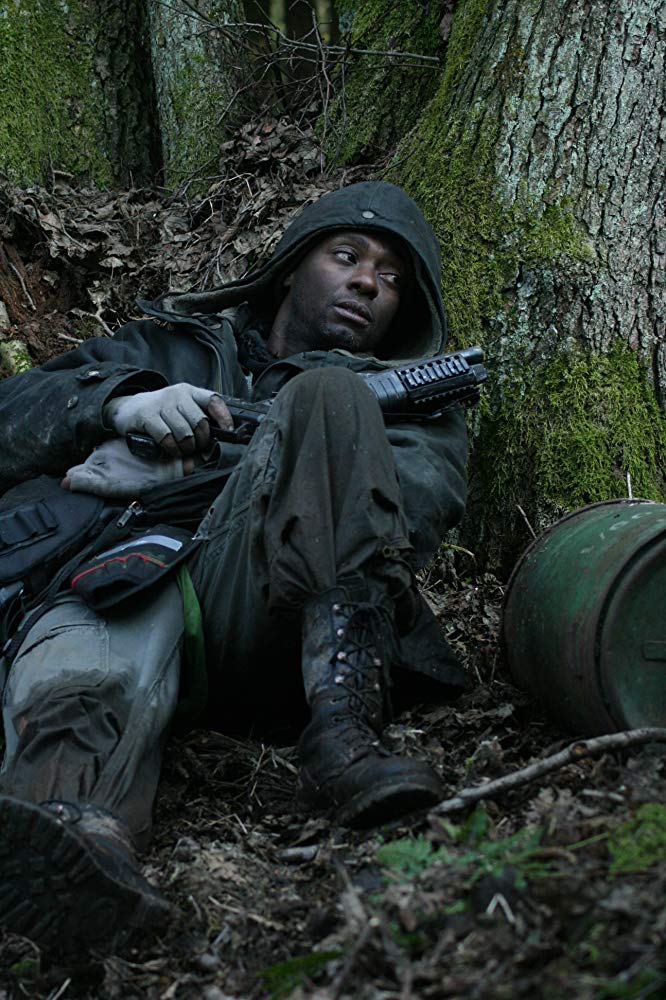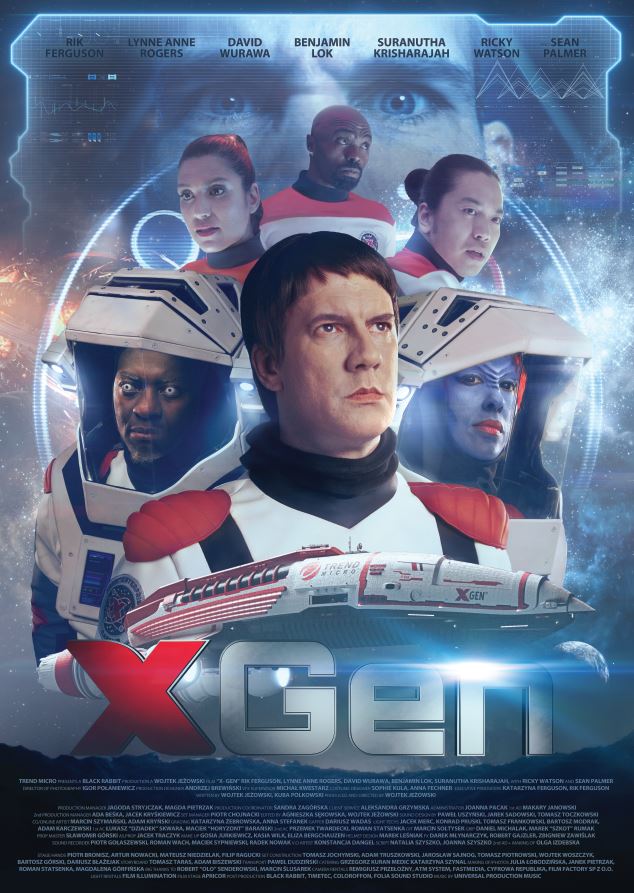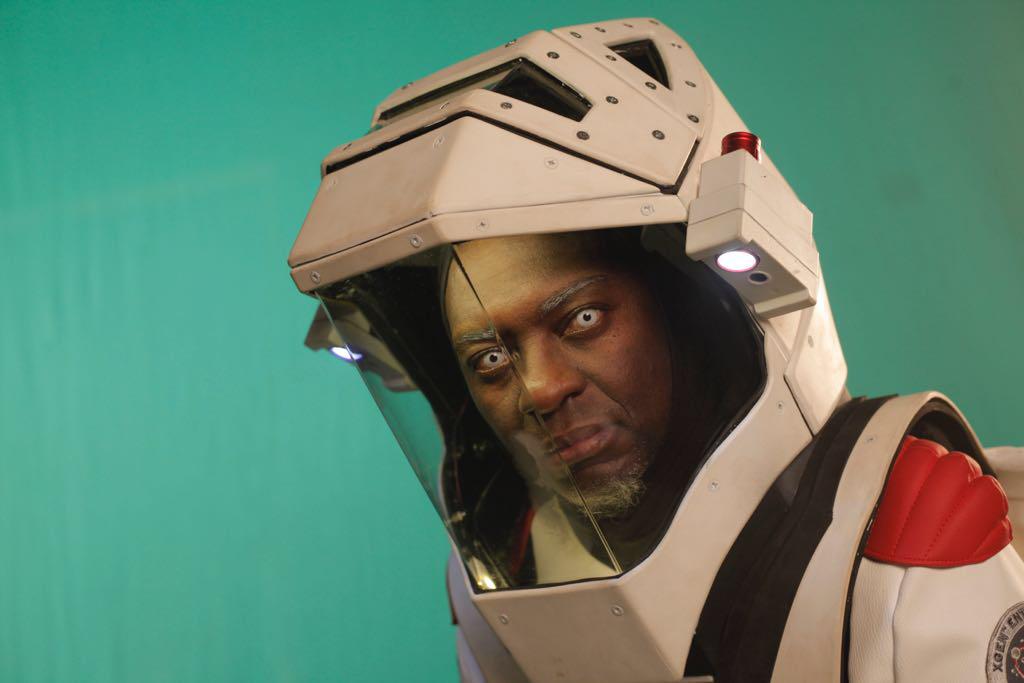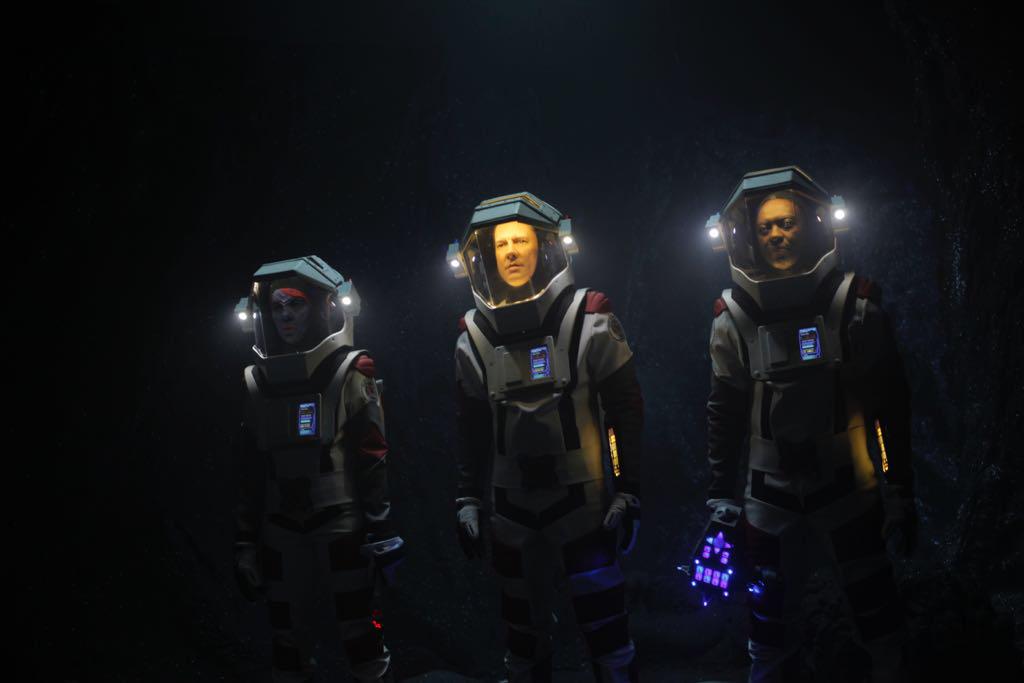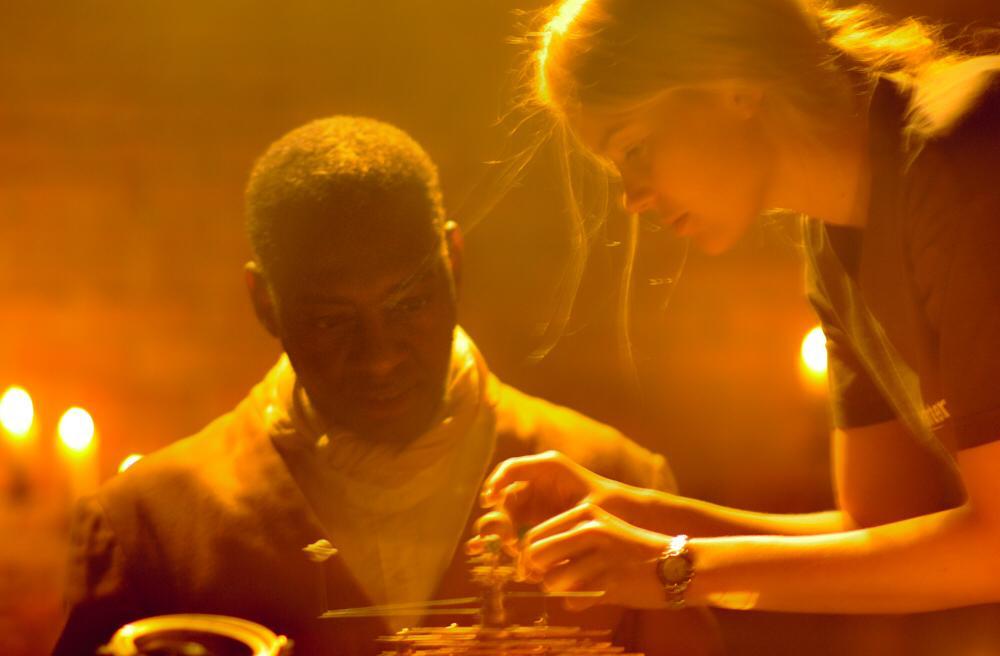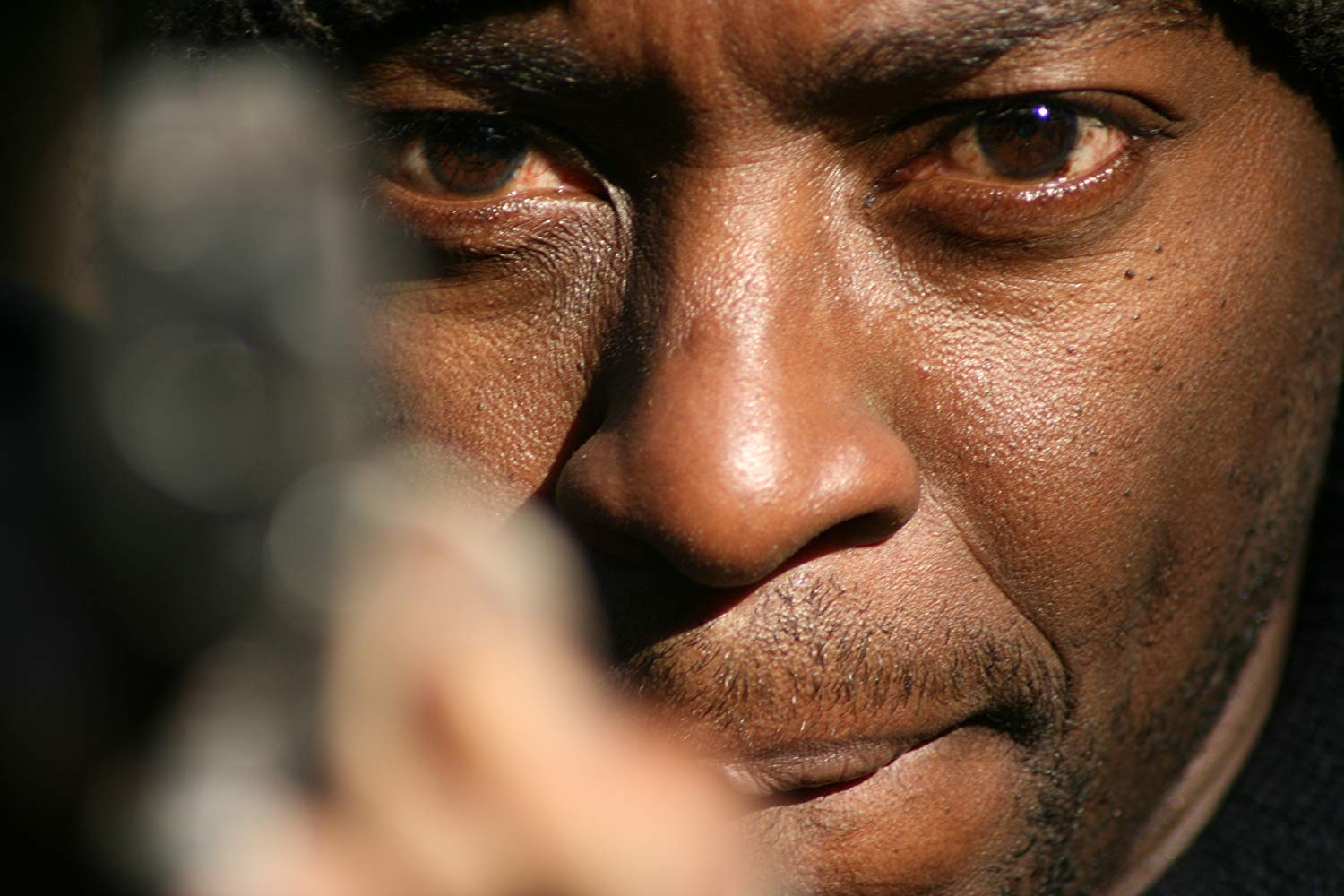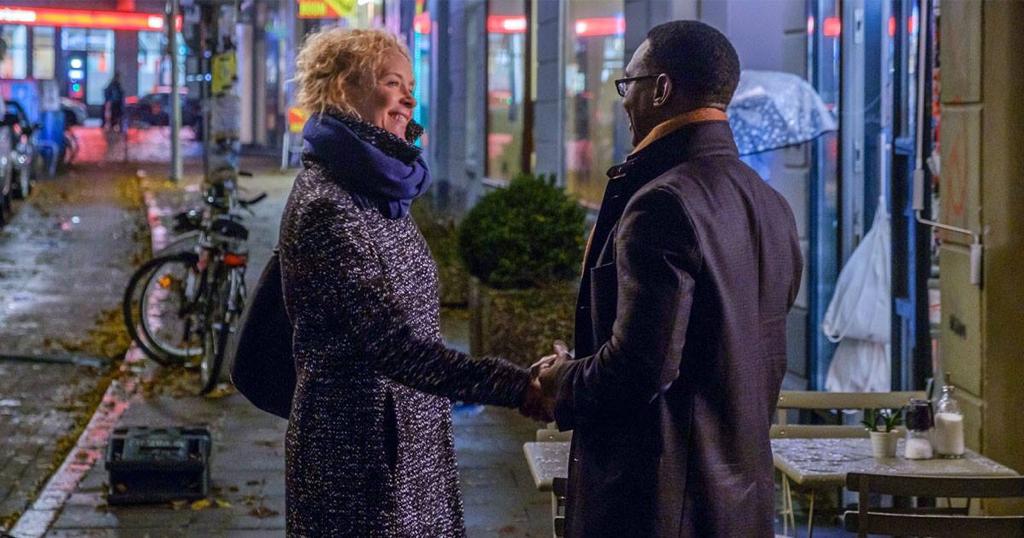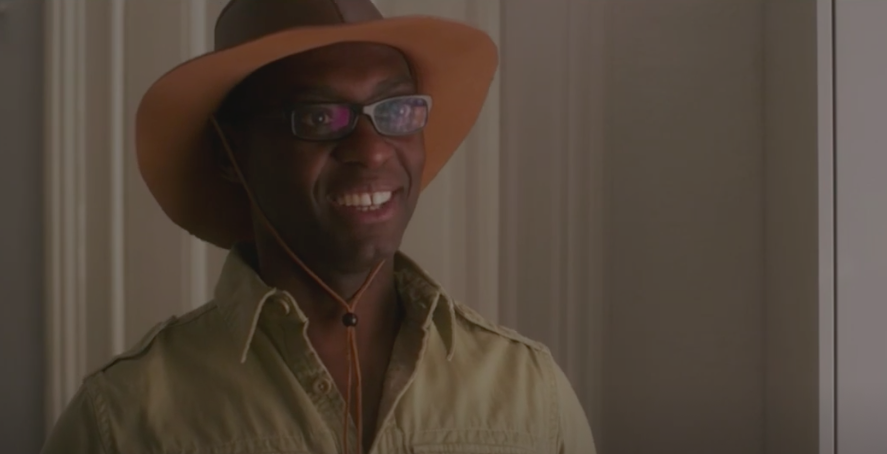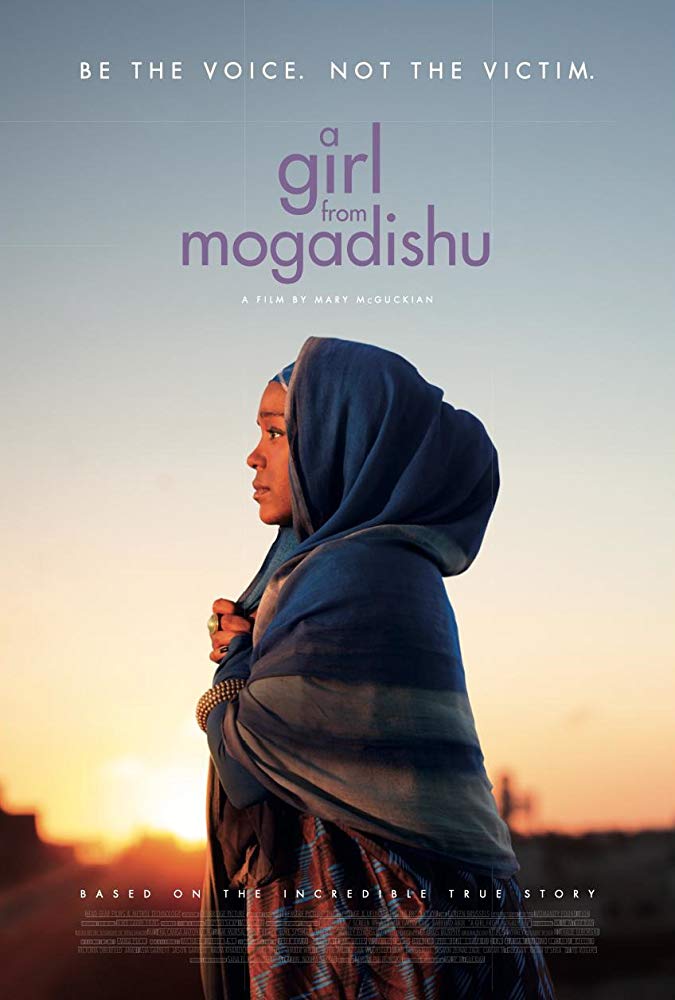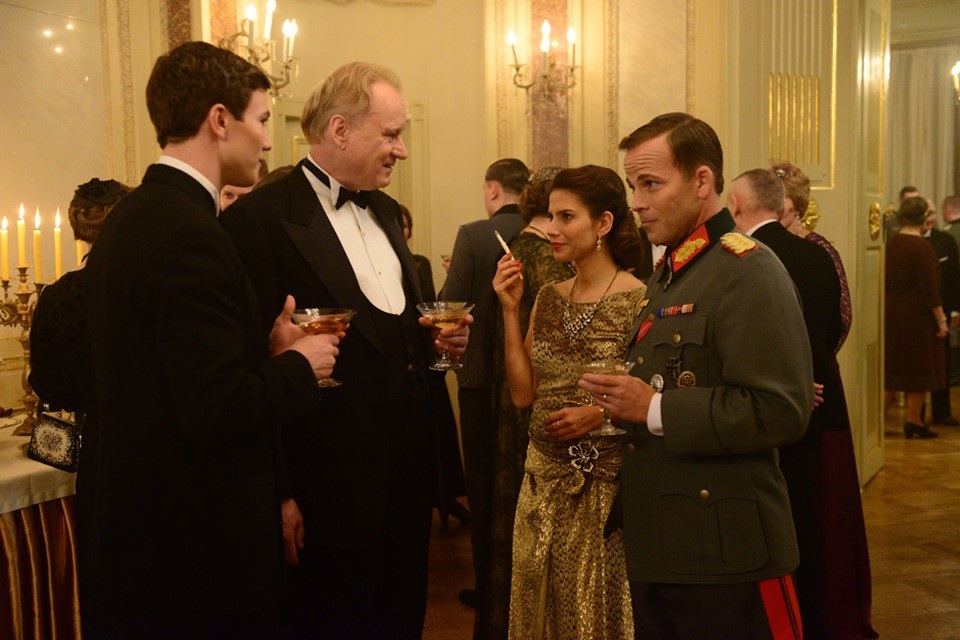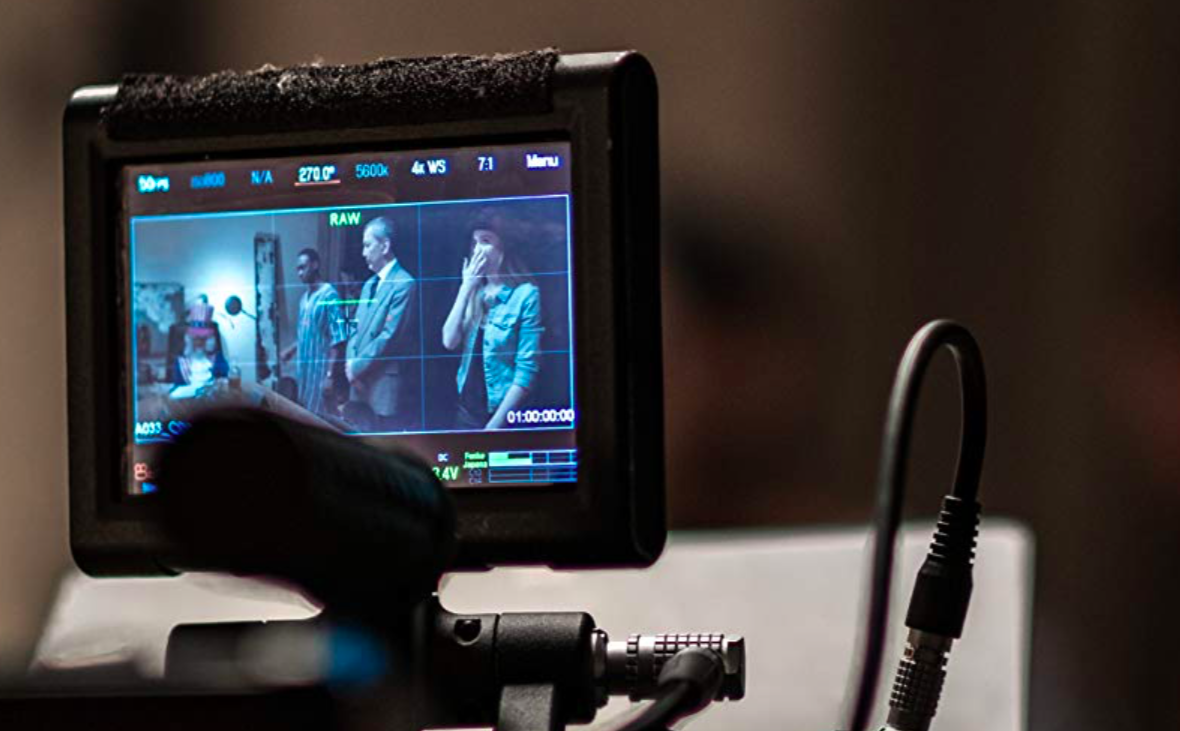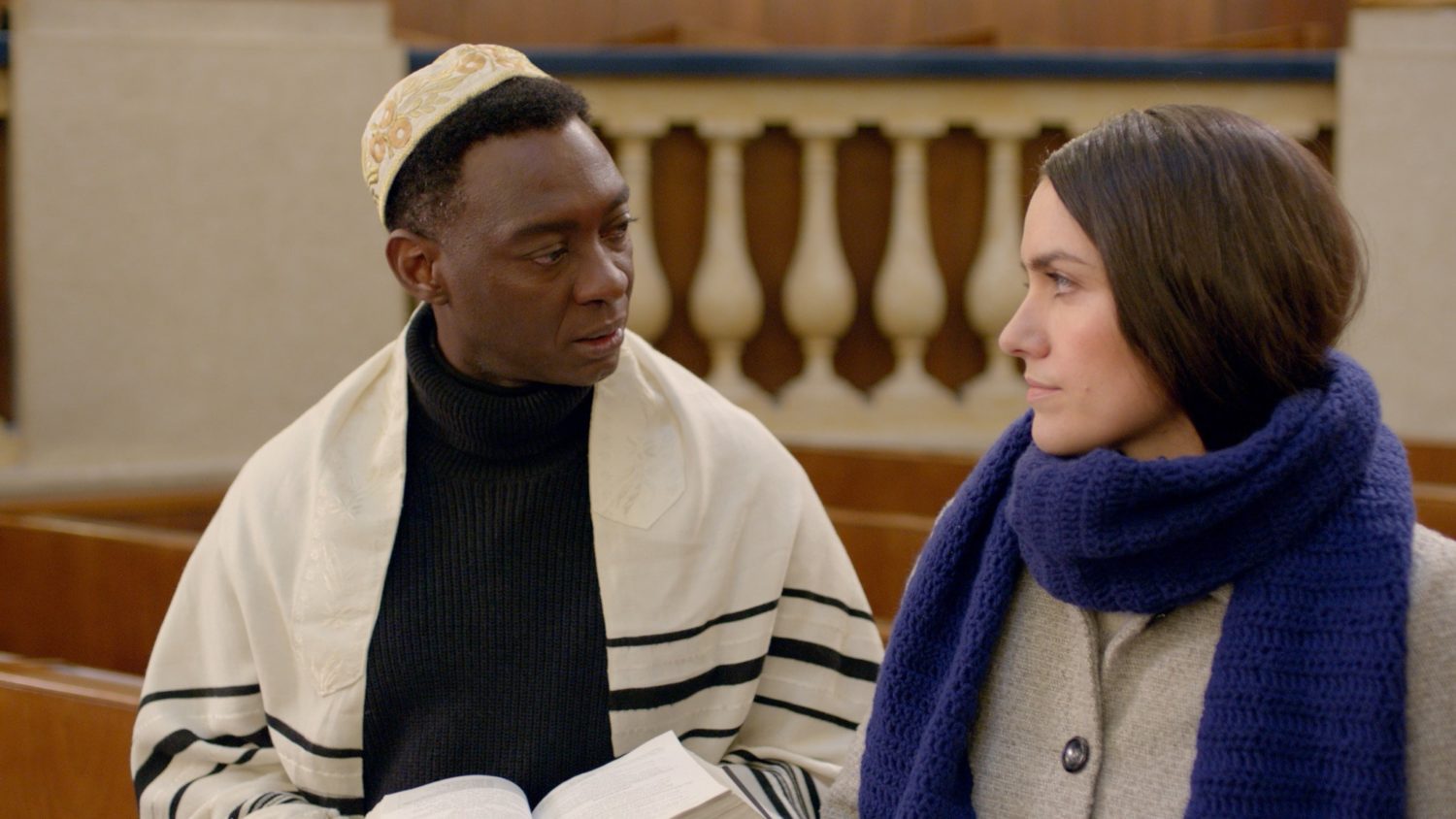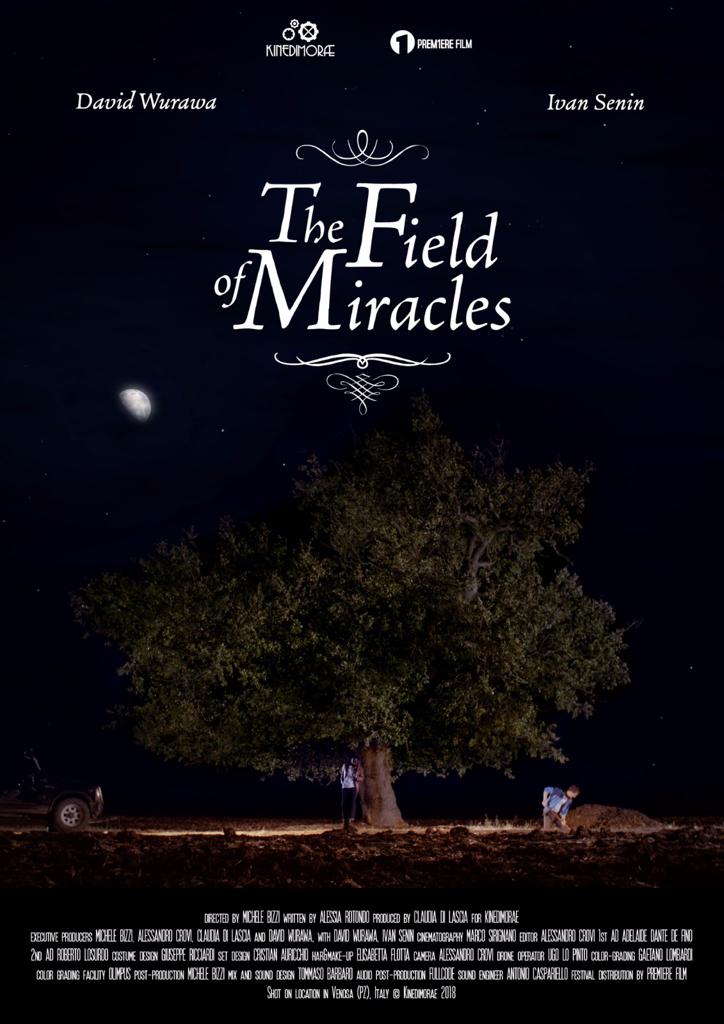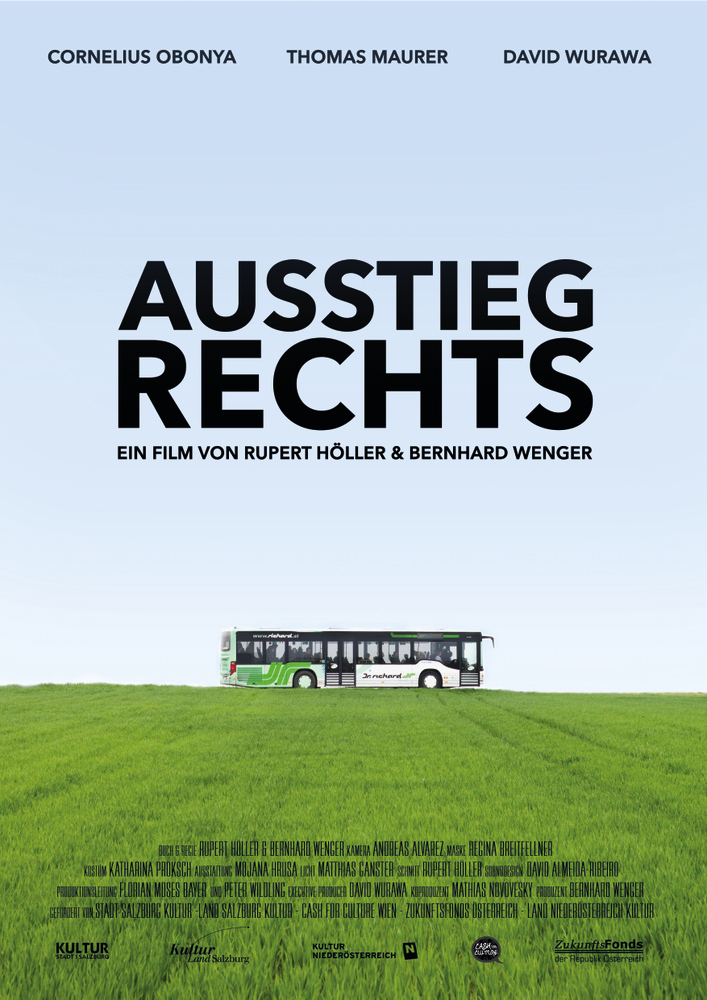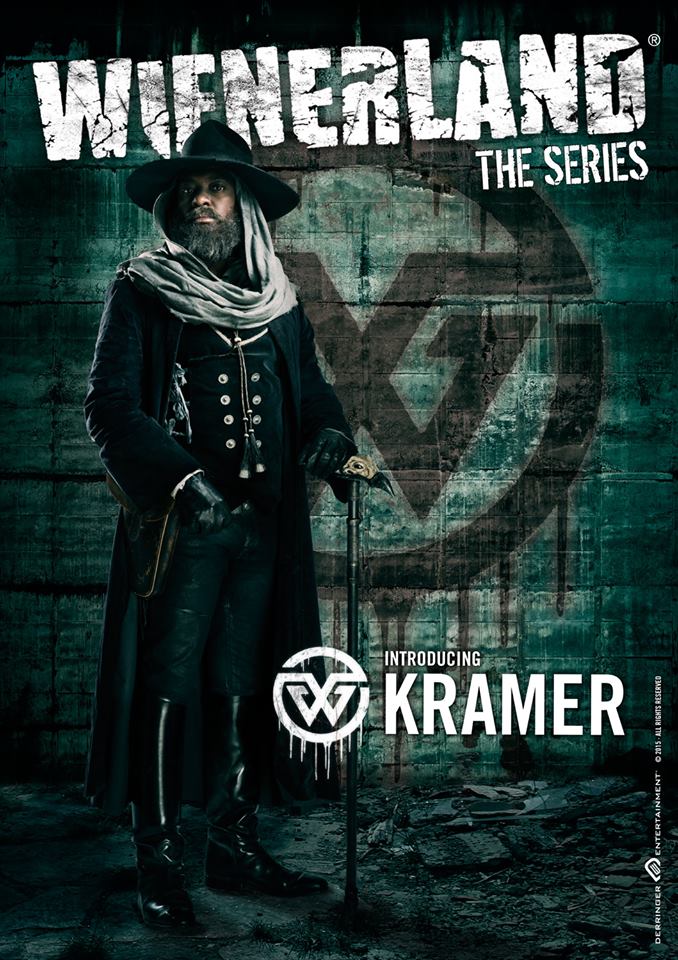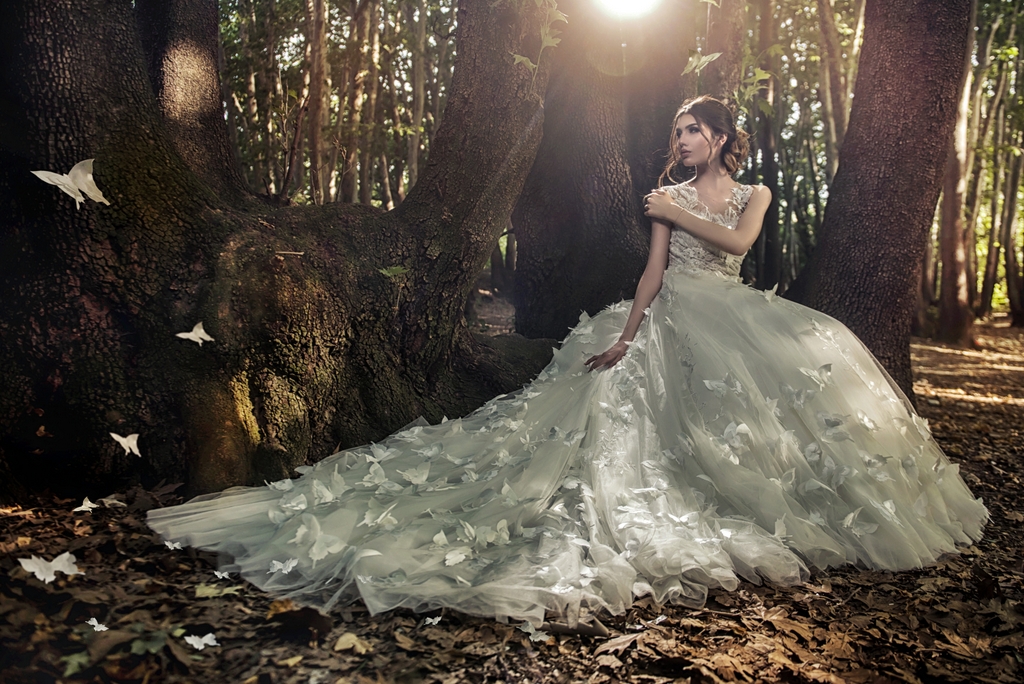David Wurawa is an award-winning actor whose credits span a gamut of roles. Originally from Zimbabwe, he currently lives in Vienna, Austria. Speaking several languages, David has accumulated an extensive international list of credits in film, television, radio, and theater.
David does not portray a character, he embodies that character. He knows his characters as well as he knows himself and one senses his inner life colliding head-on in perfect balance and understanding with the three-dimensional person he brings to life, in film or on stage. His acting goes beyond timing and technique, beyond projects that push him or allow him to take risks. He connects so deeply with the spirit of his characters that every performance is a soulful experience for his audience.
When he is not on set, he is preparing for his next project, but we managed to catch up with him.
David, thank you for taking the time to be here. We know you’re a busy man.
Thank you, happy to be here.
Your life’s journey is not so typical, so let’s start from the beginning. Where were you raised?
I was born and raised in Zimbabwe.
Would you tell us about your childhood?
My childhood was… well, I was born in the war during the revolution in Zimbabwe. There were 90 years of what is called Rhodesia, from 1890 to 1980 when the British colonized Zimbabwe. A man named Cecil Rhodes was the main instigator. I was born in 1971. From 1970 to 1980, it was the tip end of the war, so that period was quite a devastating time. There was a lot of death, a lot of suffering. The thing about it, as a kid, those things are just so heavy, they are indelible in your mind, your system.
That was a very impressionable age, for you.
For sure. It’s an unnatural way to grow up. So as kids, either you find a way to block it out, or you find a way to deal with it so you can survive and get through it. But, everybody was in the same boat.
How did you cope?
I had my issues. It took me a long time to get rid of some of the issues I had. I had a lot of nightmares. A lot of sleepwalking because you know you were always half asleep when you’d have to quickly, get up and run. It’s called sleepwalking, but for a long time, I used to do a lot of sleep running. In some ways, acting was therapeutic for me because I was dealing with personal issues on a different level than just the physical acting. I was dealing with it psychologically and spiritually, on a searching level. Acting is based on a lot of searching and trusting. So, I was dealing with a lot of those things. Acting really got me out of most of the phobias that attached to me during those troubled times.
Photo by Karola Riegler
Would you say the war was the biggest influence in your childhood?
The war was very much a big influence. On that note, that’s why I always say war is the worst thing you could wish on anybody. It’s the worst thing anybody can experience because it’s just insidious… it’s just so insidious. It brings out the worst in everybody. Even those who are the nicest people, war brings out the worst in them because it’s so unnatural. In my language (Ndebele) war is called “Impi” which means ‘the evil one’. So that’s how we feel about war. It’s the ‘evil one’ because it brings evilness out of people.
My grandfather used to tell me back in the day, that warriors were not allowed to simply come back into the community after the war. They’d go to these ‘cleansing’ camps. They would be cleansed of all the negative energy, the negative things they experienced going through the war, like taking someone’s life, before they could go home and sleep with their wives or their loved ones. It’s because this energy is attached to you and you pass it on, then it is passed on, and it is passed on again and again. So they had these cleansing ceremonies they would go through.
That was so forward-thinking. We’ve lost a lot of our sensitivities.
We’ve lost a lot of the essential spiritual things that we need.
La Pasada – Director: Anna Maria Krassnigg
What else can you tell us about growing up in Zimbabwe? Did you know from a young age that you wanted to act?
Well, my first acting experience was at age 10. Both of my grandfathers we’re very good storytellers. Sometimes I was their assistant and I loved that. For some reason or other, maybe in my past existence, I was an artist or an actor. So basically, I just rolled into my current existence. I don’t have a story, like an exciting dream, say sitting up at night, wishing to be in Hollywood or to be a superstar. It was never my dream.
I was never the type to worship or idolize someone. I don’t worship personalities, I worship abilities. I always liked certain people’s abilities. I always wanted to find out how they do things. So, acting for me was pretty much just an extension of my existence. My dream was just to tell a good story and to understand the spiritual nature of telling a story …the community aspect of it.
Also, you’ve got to understand that being African, the majority of our stories are carried from one person to the other, so there’s a lot of interaction. Actually, Africans are pretty natural actors. When you see Africans talking to each other they are completely animated. Physically, emotionally, vocally all in. It’s slightly exaggerated but, what I’m saying is that our stories are based on habits. If a people’s journey is based on their habits, then storytelling is one of our habits. It’s just in us.
We have an oral history. We also have written history, but most of it is oral. We perform the end of a season, the beginning of a season, the harvest, the hunt, the birth of a child, the death of a person, the weddings, the change in someone’s experiences or work. Everything is celebrated in some way, either as a dance, a musical piece, or a soliloquy … a story of some kind.
Acting is your mode to tell stories?
Exactly. Definitely, my mode to tell stories. I get to embody different characters with different aspirations, different career targets, so it’s something I’ve always enjoyed. It’s something that has just kind of snowballed. I remember, just before I graduated from high school, my dad asked me, “What do you want to do?” I told him I wanted to act. I thought he might be upset about it, but he said, “Okay, but remember in acting, just as in all aspects of life, people put a price on you that you put upon yourself. So, whatever you do, do not ever sell yourself short.”
Great advice. So, your parents believed in you from a very young age.
My parents were really cool. Their attitude was… if you are happy, if you are focused, you can make anything happen in whatever you choose to do. I was blessed. I’ve really been blessed with the choices I’ve made. I chose the right parents. winking.
There you go. So, what brought you to Austria?
I came to Austria to work in Vienna’s English Theater.
How did you find out about the opportunity in Vienna?
I was in Australia at the time. I had lived in England for about five years and I needed a change. My girlfriend was from Australia, but she wanted to work in Europe, so I called my agent and asked if there was anything happening in Europe. She told me there was only one equity house in Europe, Vienna’s English Theater, and they had an audition happening. I auditioned and got the job. A few months later, I was coming to Austria.
Time Will Tell – Director: Shoshana Stark
When you came to Austria, were you moving here permanently or did you think it would be a temporary thing?
My idea was that it was going to be for one year. But 20 years later, married with two children and a mortgage, I’m still here. laughing
What were your initial feelings, your first impressions of Austria? Was it a good experience?
I’m gonna tell you something. I never figured I would come to Austria. Anyway, to be honest with you, I knew Austria through history, the Austro-Hungarian empire and of course, because of its history with Hitler. That was pretty much my knowledge of Austria, so, I started reading about it.
I started learning out about Mozart and all these cats like Bach, Strauss, and then, of course, the film-makers. Then I started realizing that Austria was actually one of the instigators of film noir. Actually, a lot of the Jews that were kicked out of Austria went on to build Hollywood and Radio City, things like that. So it was fascinating for me, you know, to learn things like that. Hedy Lamarr, an incredible Jewish woman from Austria, really revolutionized things. She really changed the whole film acting landscape. She was a genius. She invented a whole bunch of technical stuff. So, I started getting a glimpse into the positive side of things.
When I arrived it was winter. I drove in from London, straight through without stopping and came in on the Rechte Wienzeile. There was snow everywhere, banks of snow and people digging their cars out. Back in the day, most of the Rechte Wienzeile was titty bars. So you have people stumbling out of these bars with neon lights everywhere. I’m driving in and I’m in an English car. It had only been 24 hours that I had previously been driving in England and I was tired. Out of habit, I started driving in the left lane like they do in the UK. Unfortunately, in Austria, the left side is the wrong side of the road. Then guess who’s coming towards me? It’s the Police!
So we’re facing each other in the middle of the street. It was rush hour. The police had stopped right in front of me, lights flashing, and they jumped out of their car. They were looking at me, like ‘what the hell’s wrong with him?’ At that point I realized…I’m driving on the wrong side of the damn street. One of the cops walks up to the car and he naturally walks to the left side of the car, which in Austria, is normally the driver’s seat. But, I had an English car, so he had walked up to the passenger seat. He hadn’t noticed that I was sitting on the right side. So, he’s looking at my car and looking inside, bending over more to find me on the other side, and he says, “Sie fahren auf der falschen Straßenseite,” in Deutsche. (You’re driving on the wrong side of the road.) I’m thinking, ‘Oh hell.’
The police officer looks at the plates and realizes it’s an English car. He asked me if I was English. I told him ‘no’ but I had been living in the UK and explained that I was going to be working in Austria. He said, ”You realize we drive on the right side of the road here?”
I said, “Yes. I just drove in from England.”
He was calm, saying, “Don’t worry about it. Where do you need to go?”
I told him we were trying to find a hotel in Laudongasse, in the 8th district, and he said, “Okay follow me.”
It was really great. They stopped traffic, turned around, and led us to our hotel. So, I had a police escort into the city. I thought that was pretty cool, the police treating me nice like that because that had never happened to me before.
New Order – Director: Marco Rosson
It seems you’ve integrated well and “learned the language,” so to speak.
It wasn’t always easy, but I appreciate the difficulties because the difficulties actually gave me the opportunity to reflect on who I am and what I’m capable of. For that, I’m quite grateful. I haven’t mastered the language, but I’ll get to it. I’ve got another 50-60 years, so I’m good. I’m appreciative of the language. The more I get into it, the more I understand the culture.
It’s impressive, the way you stuck to your decision to move here.
Over the years I’ve learned, as my dad always used to say, the idea of having a plan B negates plan A. Let plan A be your plan B and your plan C. In other words, have a plan… have a strategy.
Braunschlag – Director: David Schalko
So much of your work has a very powerful message.
That’s right. I like that in my work. I like characters that have that. In every single film and in every single story, the goal, the treasure, is the individual story. Each and every person that you see in a story … imagining their story is what encompasses the treasure in the story. It doesn’t matter if they are an extra. It’s the idea of… what is the background story? Who is that person? This, to me, is the treasure in most of the work that I’ve had.
Please tell us about the film VOID.
VOID was a passion piece. We consciously made that movie. It was quite powerful.
It was definitely one of the most memorable films and some of the most powerful acting I’ve ever seen.
It was based on Bakary J., a Gambian deportation detainee’s allegations against three Viennese police officers. How they tried to deport him and when that didn’t work they tried to kill him. When that didn’t work, they tried to deny that they were involved in the kidnapping and attempted murder…and then that didn’t work. But still, at the same time, they just shuffled the police officers around. They pushed the story around for years. They completely…well, I find it quite inhumane the way they dealt with it. But what can you do?
You did an amazing job of portraying Jerry.
Thank you. That was good work.
VOID – Director: Stefan Lukacs / www.voidthemovie.com
Was that one of the more difficult roles you’ve ever played?
It was actually the easiest role I’ve ever played.
Really? Does this go back to the influences of your childhood?
Not just my childhood. I had enough in my tank to tap on. The character was based on a plethora of injustices, you know. I didn’t have to dig so deep, it just came up.
What is one of the more difficult roles you’ve played?
I never judge my characters or the roles I play in terms of difficulty because if I did, I’d never be able to play them. It’s the same as saying good guy or bad guy. I don’t do that. I just simply try to be honest. I listen to what the character wants to say. At the same time, I don’t judge the characters in that way, because it would make it impossible for me to perform.
Wienerland – Directors: Stefan Polasek / Jan Woletz
The best piece of advice you’ve been given?
My dad was a bottomless pit of wisdom. “People will put a price on you that you put upon yourself, so whatever you do, do not sell yourself short.” That was the best piece of advice he ever gave me because it kept repeating itself. But you know, he’s moved on now. At some point, maybe he still whispers in my ear.
Do you have a story of luck playing a role in your career?
Luck is hard work and good preparation. Luck is infinite. Wishes are infinite. You can have an infinity of wishes. The universe has everything that you need. You’ve just got to tap into it. Know it’s there and wishes are infinite. So, whatever you do, don’t ever think you’ve only got three wishes. You’ve got an infinity of wishes.
So what would you say is the biggest challenge you face in your profession?
The biggest challenge I face in my profession is the projection. Human beings projecting their racial fear on me. That’s the biggest challenge I face. People project their bigotry on me. I think that’s the biggest challenge.
How do you overcome that?
“People will put the price on you that you put upon yourself, so whatever you do, do not sell yourself short.” I’m worth something to somebody. I have a name. I have a history. I have a background. When you think about it… every single human being is the culmination of billions of beings before them. What you carry is just as heavy and every bit as important as anybody else.
We all come from the same place.
Right. I don’t let anybody define me. I do not judge people or their fears. I try to be objective and I also try to be reflective. But I do not let anybody put a price on me that I haven’t put upon myself.
Being an actor was my choice. I was able to make the choices that are best for me and with the choices that I’ve made… I need to be the one to back those up.
Photo by Martin Guggisberg
Do you spend a lot of time marketing yourself?
I have a manager now. She does that in a beautiful way. I have good agents and the universe loves me. (grinning) It’s an infinite number of possibilities. I’m serious. I get a lot of work from referrals. Good work. I’m talking to really … the best directors and producers that I’ve always admired and always wanted to work with at some point in my life. They’re calling me and offering roles. So now, the work I’m doing markets itself. I’m in a good place right now. How does it get better than this?
You wear a lot of different hats. Actor, writer, producer, director; it seems you are in entrepreneur mode all of the time.
You have to be. You’ve got to be. Lethargy, for me, is a problem. I like to stay fluid. To be on the move. I just like to be doing things. I feel satisfied when I’m done with it, you know? Then I can move on to something else.
You’re an active guy. Do you enjoy working out? Dancing? What’s your secret?
Dancing is good. It’s good to move. It’s a completely spiritual side of things. Music…singing is the glue that cements everything. Where there is music, there are always people sitting around, talking, eating, dancing, communing. I always find music to be the glue for all communities.
For fitness, I do things like Capoeira, Brazilian Jujitsu, and Thai boxing. The reason being, knowing your body is a reflection of your spirit. You know the saying, healthy on the inside, healthy on the outside.
Photo by Karola Riegler
You’ve mentioned some ideas that you have, once it’s time to actually film your project. You have ideas about how to involve the people back home.
Basically, this picture, I want to shoot it all in Africa and create a mentorship program where we’ll have the local filmmakers assist the professional filmmakers that I’ll hire from Africa or anywhere else. For example, the cinematography department, I’ll make sure they have five or six assistants who are also students. Same thing with the sound department, costumes, makeup, etc.
I don’t believe in charity. I believe in investment. Investment doesn’t have to be about money. One can invest in knowledge, you can invest in experience, invest in technique. These are the things I like to invest in, not charity. Africa has received charity for 60 years and nothing has changed. It’s gotten even worse because charity creates people who are just waiting. Say the charity runs out. They are standing there with their hands out, waiting and waiting with a begging bowl for someone to put charity into it. And, he that gives charity tends to dictate to the receiver and the receiver generally feels dependent on the giver.
If you invest in someone, they can take that initiative, take that investment and make it profitable for themselves. Then they can pass that onto somebody else and it becomes something that benefits the whole community. This is something I really want to do. Just invest in people and invest in their abilities, so they can pass it on.
Paying it forward.
That’d be great. So basically when I shoot this movie, I’ll shoot it in Africa and my desire is that the production designers, the costume designers, the music composers, cinematographers, talent, investors, makeup artists, either come from Africa or have a love for Africa. It’s not to say that I want to change Africa or change how they make movies. I don’t. Tell your story the way you want to tell your story, as long as it’s true for you. For me, my truth, when we shoot this movie, it’s going to be a community that teaches each other and community that moves on and spreads out.
Brilliant. So, some random questions…for the fun of it. What’s your biggest pet peeve. What annoys you the most? Or are you just a cool cat who’s hard to annoy?
I’m a pretty cool cat…but I would say, closed-mindedness. It drives me nuts.
Die Seelen im Feuer – Director: Urs Egger
What’s the most interesting thing you’ve seen this week?
My daughter’s transformation. She’s transforming into an amazing young lady. She just turned 14 and she has great emotional intelligence and I’m very proud of her.
She stands up for herself and she trusts her choices. She’s confident, but not in an overbearing way. She just has this emotional intelligence. It is beautiful to watch. That’s the most interesting thing I’ve seen this week.
How many children do you have?
Two. My son is twelve and my daughter is fourteen.
Risky Brothers – Director: Vienzenz
What do you want to be remembered for?
I’ve never thought that far.
Well, you do have 50 years, or so, to go! Do you want to be remembered for the great stories you told or for being a great dad or what?
To be honest with you, being a great dad isn’t something anybody should be praised for. It should be something that we do. People wanting validation for something they should be doing doesn’t make any sense.
What do I want to be remembered for? That’s a very good question. I’ve never thought about this. It’s such a final question. Why don’t you come back and ask me this when I’m 100 years old, or so. Come back to me in about 60 years for an answer to that question.
Well, like it or not, you’re going to be remembered for a lot of good stories.
That …that’s a definite.
If you could have one superpower what would it be?
It would be the superpower to listen and transform the information into something that is conducive for all communities. Something that is sustainable. To listen…to hear somebody out.
I think you do that.
I don’t know? I don’t think so. Sometimes, I can be a bastard, I’m sure. I want to have a full understanding of what I’m hearing. That would be a cool superpower. To be able to fully grasp all the dynamics …a complete understanding.
Like highest potential?
No, even the lowest potential. The thing about it is, what happens is when we don’t want somebody to understand something, we complicate things. So that hides the truth. But, understanding would be a simplification.
Xgen – Director: Wojtek Jezowski
Xgen 2 – Director: Wojtek Jezowski
What would be on the gag reel of your life?
Come back to me in 60 years.
Nothing for the gag reel yet? Everything’s been perfect?
Even if it’s imperfection, it’s been perfect.
Kind of a ‘life doesn’t happen to us, it happens for us’ philosophy?
There you go, exactly. Think about it. I made decisions in my life that have me sitting here, right now. I’m very proud of every decision I made even though sometimes it took me way off the path, but all the things I learned when I was off the path were very important for me when I got back on the path.
For all of us, it’s important to learn from those deviations.
Sitting here at this moment, this is something I never imagined I’d be doing. I’m sitting here with you, in the 1st District of Vienna, Austria. I have two great kids, a wonderful wife, an apartment, homes I can vacation in. I have healthy people around me, my mother is healthy, my brothers and sisters are healthy. My mother-in-law’s healthy. You’re healthy, my friends are healthy and successful. So, basically… I’m just grateful.
I’m grateful for everything that has happened to me in my life because it has led me to be right here, where I am, right now.
Time Will Tell – Director: Shoshana Stark
For anyone back home thinking of leaving…the young people in Africa’s up-and-coming emerging markets, do you have any advice? Would you suggest they leave home to get experience, or stay there and use their talent to make ‘home’ a better place?
The thing about it is this. Really sit down and ask yourself the question, “What direction do I want my life to take?” Staying home, it doesn’t make much of a difference. What makes a difference is what you wish to do with your life. Even if you leave Africa, you should never forget that it doesn’t leave you. It’s on planet earth as well.
Don’t buy into this bullsh ** “third world country” crap. It’s just psychological manipulation to make you feel like you’re from a different planet, which has nothing to do with mother Earth. But your mother is Earth! Africa is where the mother of Earth started.
So, basically, if you are African, believe in your worth. You are worth a lot more than the world has been trying to tell you. You are more than society has been trying to impose on you. If you want to leave, then leave. But don’t forget to look back, or go back, if you wish to, and don’t forget that right now, we’re living in the best times on this planet. You can be in one part of the world and still deal with someone on the other side of the world. We have the technology to do that. Completely different times zones and you can actually get a project together with someone in Brazil while sitting here in Austria and somebody else is in Zimbabwe. You can get your laptops together and put your ideas together. We’re not so far apart anymore. We’re very close to each other. Don’t feel that you are alone.
Do not worship anybody. Worship their abilities. This is an old African philosophy, that we worship abilities. We don’t worship the eagle, we worship the eagles’ ability to soar high above us, to see small things from a great distance, and the gift of night vision. That’s what you want to learn, that’s what you want to achieve, and that’s what you want to figure out. I don’t worship anybody, and I don’t mean that in an arrogant way. For instance, I don’t worship Denzel Washington, I worship his abilities and what he is capable of. I do not worship Henry Cele or Angela Bassett, I worship what they are capable of. Spike Lee, I worship his capabilities.
You can go on and on and on. Because what happens is you don’t want to be stuck in the idea of worshiping somebody. Worship what they’re capable of and what they can do. And by worshiping…. I’m talking about learning from them. Learn how they do what they do and why they do it. Don’t think, I want to be like him or I want to be this person. Just figure out how to emulate those people’s abilities.
Also, I would say to the Africans in Africa… a lot is going to come out of Africa and a lot is going to go into Africa. Do not be afraid and do not be ashamed of any part of the history of Africa. The slavery, the colonization, all that crap… do not be ashamed of it. We should take that and use it because it’s fuel. Go forward with it, because any people who have survived what we have survived should be proud. We should be really proud. The only thing right now is to take that pride and put it into something constructive…into teamwork, into community work. Never be ashamed of who you are.
Risky Brothers – Director: Vienzenz
You do a lot to bring awareness to all of the issues that have gone on.
It’s selfish. I do it for me. I want to be aware of it.
It’s like the teacher becomes the student?
One is better off learning than trying to be the teacher, all the time. Take, for example, I had an interview where they asked me how I could play an immigrant. I said, “Yes. I’m playing an immigrant. I am an immigrant and I’m not ashamed of it.” I will not pretend that I’m from Europe. I’m grateful for Europe. I’m grateful for the citizenship that I got from Austria. Austria also gave me the push to go deeper into the world. I understand that and I appreciate all that, but at the same time, you have to understand that my playing an immigrant should not be insulting to anybody.
There are immigrants. We are immigrants. We should be seen and heard. We are a part of society. We are here. There is nothing to be ashamed of. What one should focus on when you’re playing in the grand scheme, is who is this person? What is their background? They are three-dimensional beings, not two-dimensional beings. They are a person, somebody with the dreams and aspirations, fears and hopes, possibilities …all those things.
Goliath96 – with Katia Riemann. Director: Marcus Richardt
What’s the answer? What’s the answer to all of us just seeing each other as human beings without seeing color.
We should see the color. When you look at a rainbow you see the colors. Seeing color is not negative.
But I mean, without any kind of filter. This is you and this is me… and look, it’s not that much different, almost the same.
There’s not much difference, but the thing is, I like the difference. I like the fact that you’ve got lighter skin and I’ve got darker skin. I like that because, it shows how variant life can be, and at the same time, how identical it is.
How do we get past all that is going on in the world today in regard to race?
One, you have to understand that the idea of race is pretty new. It was used as a way to justify the abuse of the abducted Africans who were being taken into the America’s and the Caribbean to be enslaved. And two, the idea of color is quite ridiculous. It’s idiotic in a lot of ways, to dislike somebody based on their color.
This is a shallow way of thinking. This is somebody who has no sense of depth. What happens when you want to understand somebody? You just simply talk to them. Get a feel for the person. Find out who they are. Then you’ll understand. But if it’s simply a visual thing, it’s dismissive, which means whoever does that has a problem with him or herself. Or they have issues that they’re dealing with and they’re projecting those issues onto you.
Personal and emotional education will help create the society we are trying to build. Judging somebody purely on race, gender, social standing, or age, is judgment without depth. And, it’s not a sustainable way of existing. For me, I see color. I love different colors, but I see the differences without judgment.
My experiences have taught me a lot, and in regard to acting, it’s like a fine wine. It needs time to mature. You need experiences, something in your ‘tank’ to base things on. The older I get, the more I understand my path in acting…the better my shoes fit. winking
David thank you, thank you so much.
Currently Filming:
Television: RACKO
Racko – Ein Hund für alle Fälle (1/13)
New Movie Releases:
GOLIATH96 – Director: Marcus Richardt
A GIRL FROM MOGADISHU – Director: Mary McGuckian
A Girl from Mogadishu (2019) – IMDb
I’LL FIND YOU – Director: Martha Coolidge
FIRST WORLD SOLUTIONS – Director: Maira Stork
First World Solutions (2018) – IMDb
FIELD OF MIRACLES – Director: Michele Bizzi
The Field Of Miracles (2018) – IMDb
AUSSTIEG RECHTS – Director: Rupert Höller / Bernhard Wenger
AWARDS
David is currently finalizing financing on the following Film and Television projects.
Any financiers interested in investing in movies and/or television may contact him at [email protected]
BLOOD ROOTS
Blood Roots is an independent thriller-horror feature film. The story is based on an investigation/manhunt inspired by the classic thriller, serial-killer, detective movies of the ’80s and ’90s, such as ‘Zodiak Killer’, ‘Seven’, and ‘Summer of Sam’.
Framed in the beautiful Italian regions of Lombardy, Piemonte, and Liguria, the story takes the viewer on a spectacular journey through Italy while exploring the current immigration crisis. Blood Roots is inspired by the most heinous serial killers and their modus operandi.
LEAGUE OF THE RHINO
This picture will be shot in Africa. ‘The League of the Rhino’ is an action-adventure tale with a hard-hitting blend of 80s action themes (Commando, Aliens), desert road movies (Mad Max, Book of Eli), and high concept contemporary elements (Fight Club, High Rise, American Psycho).
The year is 1985 and the setting is a fictionalized East African Republic. Anita Saint John, a forceful American protagonist, has a vision for an extreme tourism package to take on the poachers who are devastating the country. This package, the self-styled ‘League of the Rhino’ will involve weekend warriors, extreme tourists, and adrenaline junkies who are given guns and told to go out and change things for the better. Members of the League have a human targets, the poachers. They, along with their leader, Saint John, are determined to get results.
In the course of the action, the League faces determined opposition, both internally and externally. The poachers and their masters are ferocious, while self-doubt increasingly afflicts the League. The story riffs off the utopian concepts and their unintended results, by writers such as JG Ballard and Michele Houellebecq.
The action evokes such recent adventure films as Black Panther, Kong: Skull Island, John Wick, Mad Max: Fury Road, and V shows Narcos and Queen of the South. Amidst the plot-driven adventure, ‘The League of the Rhino’ shines a light on animal poaching, a much-discussed and urgent current topic.
WIENERLAND
‘Wienerland’ is a fantasy/western genre-mix exploring the boundaries of society, ethics and perceived reality. The respective story lines, brought to life by a diversified cast, examine the potential aspects of inter- and intra-personal dilemma and are carefully interwoven to present an intricate bigger picture. The epic story is driven by elements of action, adventure, humour and horror, as well as sex and violence. A naturalistic approach of the fantasy setting lays the ground for an affecting multi-facetted Hero’s Journey.
We accompany the young woman Atalja on her road to self-awareness as she learns life’s lessons the hard way. She must learn that she cannot escape her responsibilities… in and for her world. To change the world, she needs to explore her inner self and question her reality, even at the risk of losing herself in the process. As her journey takes her further, the lines between “black and white” and “good and evil” fade away to reveal the true nature of ‘Wienerland’.
“Wienerland – The Series” brings together two genres of heroic epics, legends and desires in a unique way. A classic western setting infused with mystical fantasy lore sets the stage for the conflict between the technologically advanced humans possessing steam engines and gunpowder, and the Otherlings’ heritage of tradition and magic. The storytelling and visual design of “Wienerland” create a tangible experience of this conflict, its participants and their world, for the audience, thereby manifesting an identity, upon which additional elements of the franchise can be built.
For more information go to www.davidwurawa.com or www.imdb.com – David Wurawa.
